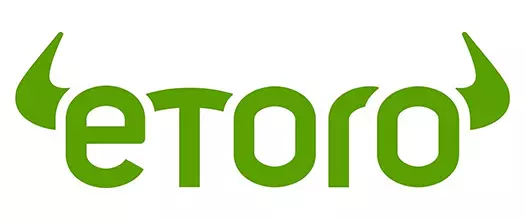In 2023, the global social trading market reached $13.6B (£10.1B), with projections estimating it could escalate to $24.3B (£18.03B) by 2030. This surge is predominantly driven by activity in Europe and North America, regions characterised by mature financial markets and high investor engagement. However, the practice has also gained traction with UK-based traders, with many UK-friendly Forex brokers now featuring social trading capabilities.
 Eightcap
Eightcap IG
IG FxPro
FxPro eToro
eToro Pepperstone
Pepperstone Axi
AxiBelow, you can find more information about the best social trading platforms in the UK:
- Eightcap enables social trading through integration with TradingView, an advanced platform that is home to a social community spanning more than 100 million members worldwide.
- IG is an FCA-licensed broker that provides a community forum for discussion-based social insights in which traders can exchange ideas and advice.
- FxPro allows customers to replicate the positions of others via the cTrader Copy feature; alternatively, the SuperTrader signals on MetaTrader 4 can also be used.
- Launched in 2007, eToro is a true pioneer in social and copy trading, enabling clients to follow experienced traders, view their profiles, and replicate their positions via the proprietary CopyTrader platform with zero copying fees. Users can also take advantage of eToro’s Smart Portfolios.
- Pepperstone supports copy trading through a dedicated proprietary app, though MetaTrader Signals and cTrader Copy can also be used.
- Axi offers copy trading through a proprietary Axi Copy application. Interested customers can download the app from Google Play or Apple’s App Store, connect it to their MT4 accounts, and select the traders whose positions they wish to replicate.
Social trading is an innovative approach that enables UK individuals to connect with fellow traders, share insights, and replicate strategies, fostering a collaborative environment that is transforming traditional trading practices. Social trading’s appeal lies in its potential to enhance performance and mitigate risks by leveraging the collective knowledge of the community.
The UK’s Financial Conduct Authority (FCA) oversees these platforms, ensuring they adhere to regulatory standards designed to protect investors. This regulatory framework provides UK traders with the confidence to explore social trading as a viable component of their investment strategy.
As the landscape of trading continues to evolve, brokerages featuring social trading are making it easier than ever for UK investors to access various asset classes, including stocks, ETFs, and cryptocurrencies. This democratisation is enabling a new generation of traders to engage with the markets in a more interactive and informed manner.
The Concept of Social Trading Explained
Social trading combines social media, online communities, and trading platforms to create a unique and interactive experience. It allows traders to connect with others, share ideas, and learn from each other’s successes and failures.
Social trading platforms provide a range of tools and features, including live feeds, forums, and chat rooms, where traders can discuss market trends, share analysis, and exchange tips. This collaborative approach to trading allows individuals to tap into the collective knowledge and expertise of the community, making it easier to navigate complex markets and make informed decisions.
ZuluTrade, meanwhile, is a leading social trading platform supported by several UK-regulated brokers. It allows traders to automatically copy the strategies of top-performing investors across Forex, crypto, and other markets. With built-in risk-management tools and transparent performance data, ZuluTrade makes it easy for UK users to follow experienced traders while staying in control of their investments.
How Is Copy Trading Related to Social Trading? Are They the Same?
Copy trading and social trading are closely related concepts, but they are not exactly the same. Copy trading refers to the practice of automatically replicating the trades of another trader, often an experienced or successful one. Social trading, on the other hand, encompasses a broader range of activities, including discussion, analysis, and learning from others.
In the UK, copy trading is a popular feature among social trading platforms. However, it is essential to note that copy trading carries risks, and traders should carefully evaluate the performance and credibility of the traders they follow. UK traders should also be aware of the fees associated with copy trading, which can vary depending on the platform and the trader being copied.
Popular Social Trading Platforms Adopted by UK Forex Brokers
Social trading is becoming increasingly popular among UK investors, offering an engaging way to learn, share, and grow through the collective wisdom of the trading community. Several UK-friendly platforms stand out by integrating social features directly into their trading services, making investing more accessible, even for beginners.
eToro
The proprietary platform of eToro is one of the best-known software solutions in the social trading space. Regulated by the UK’s Financial Conduct Authority (FCA), eToro enables users to follow, interact with, and copy the trades of successful investors.
eToro’s CopyTrader feature lets users automatically mirror the portfolio and actions of top-performing traders, which is especially helpful for those who want to benefit from expert insight without managing every trade manually. eToro also supports a wide range of assets in addition to Forex, including UK and global stocks, ETFs, cryptocurrencies, and commodities, making it a versatile choice for those interested in diversification.
TradingView
Another name that has taken off in the UK is TradingView, a powerful charting and analysis platform which doubles as a vibrant social network for traders. While not a broker itself, TradingView integrates with several UK brokerages and allows traders to publish ideas, follow others’ analysis, and engage in community discussions. It is widely used for its advanced charting tools and is a favourite among more technically inclined investors.
ZuluTrade
ZuluTrade is a global social trading platform that connects traders and investors. It allows UK users to follow and copy the strategies of experienced signal providers across various markets, including Forex, crypto, and indices.
Regulated in the EU and partnered with FCA-regulated brokers, ZuluTrade offers flexibility in broker selection while maintaining regulatory oversight. The platform includes performance rankings, risk-management tools, and detailed analytics to help users choose traders that align with their risk tolerance and goals.
Popular UK-Friendly Social Trading Platforms Summary
As social trading continues to grow, UK traders can expect even more integration of social features into the platforms they already use.
| Feature | eToro CopyTrader | TradingView | ZuluTrade |
| Type of Platform | Broker & social trading platform | Charting & analysis tool with social features | Social trading platform (works with brokers) |
| Copy Trading | Yes – automatic trade copying | No – idea sharing only | Yes – automatic trade copying |
| Social Feed/Community | Built-in social feed, comments, and updates | Active idea-sharing & discussion threads | Community-driven with trader profiles |
| Trader Performance Stats | Transparent stats on risk & returns | Limited – mostly shared manually | In-depth stats, rankings, risk scores |
| Assets Covered | Stocks, ETFs, crypto, Forex, commodities | Any asset (via user-generated content) | Primarily Forex, crypto, indices |
| User Interaction | Follow, comment, copy traders | Like, comment, follow analysis | Follow, copy traders, customise strategies |
| Regulated for UK Users | FCA-regulated | Not a broker – integrates with UK brokers | Works with FCA-regulated brokers |
| Best For | Beginners to intermediate traders | Technical traders, analysts | Traders seeking advanced copy-trading options |
Order Execution Speed on TradingView Platform
Advantages and Disadvantages of Social Trading
Social trading offers a range of advantages and disadvantages that UK traders should be aware of, so that they can properly assess whether this type of trading experience is suitable for them.
The advantages of social trading include:
- Improved trading performance through access to collective knowledge and expertise
- Reduced risks through diversification and sound risk management
- Increased transparency and accountability through community oversight
- Opportunities for learning and growth through interaction with other traders
- Access to a range of trading strategies and approaches
- Potential for higher returns through copy trading and other social-trading features
However, there are also some disadvantages to consider, including:
- Risk of following inexperienced or unscrupulous traders
- Potential for information overload and analysis paralysis
- Dependence on the performance of other traders, which can be unpredictable
- Lack of control over trading decisions and outcomes
- Risk of emotional trading and impulsive decisions
- Potential for platform fees and other costs associated with social trading
UK traders should carefully evaluate these pros and cons before engaging in social trading. It is essential to choose a reputable and reliable social trading platform, assess the performance and credibility of other traders, and stay focused on one’s long-term goals.
Risks of Social Trading UK Traders Should Consider
UK individuals who engage in social trading should be aware of the risks involved, including the risk of following novices or traders who are dishonest about their skills or potential performance. Social trading platforms often provide a range of features and tools that enable traders to evaluate the performance and credibility of other traders, but mistakes can still be made.
Additionally, social trading can be emotionally challenging, particularly when traders experience losses or setbacks. UK traders should be aware of the risk of emotional trading and impulsive decisions and take steps to manage their emotions and stay focused on their long-term goals.
Taking steps to minimise one’s exposure to risks is also crucial. This includes carefully evaluating the performance and credibility of other traders, staying focused on long-term goals, and avoiding impulsive decisions. By being aware of the issues that may arise and taking steps to mitigate them, UK traders can minimise their exposure to potential losses and maximise their chances of success.
Tips for Social Trading
UK traders who are new to social trading can benefit from a range of tips and strategies that can help them get started.
- First, it is essential to choose a reputable and reliable social trading platform that provides a range of features and tools.
- Second, traders should take the time to evaluate the performance and credibility of other traders and carefully consider their decisions before following or copying their trades.
- Third, traders need to stay focused on their long-term goals and avoid making impulsive decisions based on short-term market fluctuations.
- Finally, traders should be open to learning and willing to adapt their strategies and approaches as they gain experience and insight.
In the UK, social trading platforms often provide a range of educational resources to support traders in their learning journey. Trading tools geared towards making users better equipped to navigate the markets are also abundant.
For example, eToro’s platform provides a range of webinars, tutorials, and guides to help traders get started with social trading. TradingView, on the other hand, provides a powerful set of tools to help traders analyse markets and evaluate trading ideas shared by fellow traders.
By taking advantage of these resources and staying focused on their goals, UK traders can unlock the full potential of social trading and achieve success in the markets.
FAQ
How do social trading platforms in the UK handle the issue of trader anonymity, and what measures are in place to protect traders’ identities?
Social trading platforms in the UK allow traders to remain anonymous if they choose to do so. However, traders must still provide identification and proof of address to their broker of choice to comply with anti-money-laundering regulations. Platforms may also use pseudonyms or usernames to protect traders’ identities.
Can social trading platforms in the UK be used for trading non-Forex financial instruments, such as bonds or commodities, and what are the benefits and risks of doing so?
Yes, many UK social trading platforms offer access to bonds, commodities, and other asset classes. Benefits include exposure to different markets and learning from experienced traders, while risks involve market volatility, leverage (on some instruments), and the potential to follow strategies that may not be suitable for their trading goals.
Is social trading legal and regulated in the UK?
Yes, social trading is legal in the UK, and many platforms operate under the supervision of the Financial Conduct Authority (FCA), ensuring compliance with investor protection and transparency rules.
Do I need trading experience to use social trading platforms?
No, social trading platforms are designed to be beginner-friendly. They typically allow users to learn from experienced traders and even automatically copy their trades, though it is still important to understand the risks involved.
Are traders’ funds safe when engaging in social trading with a UK broker?
If the broker is FCA-regulated, UK traders’ funds are held in segregated bank accounts and are protected by the Financial Services Compensation Scheme (FSCS), which offers up to £85,000 per person in case the firm fails to meet its financial obligations.